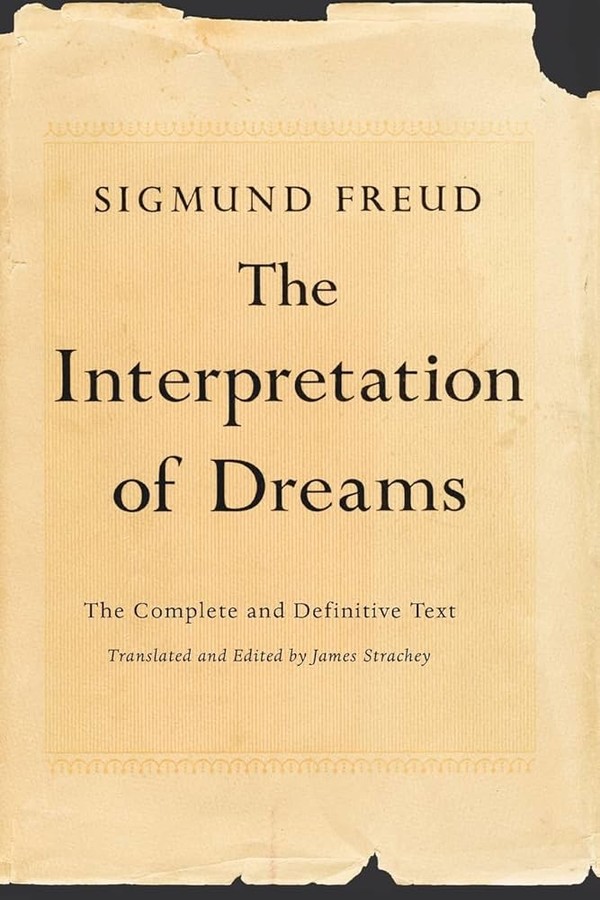Have you ever woken up in the morning and immediately searched for dream interpretations on your phone? Have you experienced a sense of unease after reading those dream interpretations making you cautious in your actions throughout the day? Despite being in the age of science proving almost everything, many people still hold superstitious beliefs about dreams. We all dream, even if those dreams aren't always remembered. Considering the fundamental human need for sleep, 'sleep' and 'dreams' can be likened to the relation of a needle and thread. They are so intimately connected to us, yet somehow feel distant from our reality. Today, let's explore various stories related to the peculiar world of dreams with CAH.

Interpretation of Dreams by Sigmund Freud
Sigmund Freud, widely known for defining the world of the 'unconscious,' was an Austrian psychiatrist who also took a keen interest in the realm of dreams. He believed that dreams played a crucial role in revealing the existence of the unconscious and sought to understand the world of dreams from a scientific perspective, addressing superstitious dream interpretation in his famous work The Interpretation of Dreams. Freud emphasized the psychological value of dreams and attempted to approach them from a scientific standpoint. He highlighted the similarities between dreams and mental disorders, formulating his own approach to interpreting dreams. He thought dreams are an area heavily influenced by an individual's unconscious, so interpreting dreams is akin to accessing the unconscious. According to Freud, it was similar to diagnosing patients with mental illnesses. He also emphasized that the essence of dreams is wish fulfillment. Many past desires are depicted as being fulfilled in dreams, and he suggested that repressed childhood wishes lie beneath these dream manifestations. However, since these wishes are disguised in surface-level dreams, they need to be uncovered through analysis. Freud's psychology based on dreams delves more deeply into the human unconscious world, offering a pioneering attempt at a new perspective on dreams.

During REM Sleep
In modern times, the concept of dreams is defined through the notion of "rapid eye movement (REM) sleep[1]." According to information on the official website of the Korean Academy of Sleep Medicine, a dream is a physiological phenomenon that occurs during a state of sleep progression. As the excitability within the central nervous system diminishes and brain activity decreases, the brain enters a peaceful state, ultimately leading to a state of disintegration in brain activity. Dreams that occur immediately upon falling asleep tend to be shorter. If someone is awakened shortly after falling asleep, they don't usually say they had a dream. In other words, these dreams don't leave a lasting memory and pass by quickly. Around 70-80% of longer dreams with concrete content that individuals recognize as having dreamed about occur during the REM sleep period. The remaining 10-20% of dreams tend to occur during the non-REM (NREM) sleep phase. In fact, REM sleep accounts for a very short period of our total sleep, only about 1 hour and 30 minutes of a full night’s rest. Therefore, the time spent not dreaming is much more extensive than the time spent dreaming when we sleep.
If the duration of complex dreams during REM sleep becomes excessively extended, a feeling of not having obtained sufficient sleep may arise. Some people frequently worry about dreaming too much, while others claim to rarely dream. Such differences can stem from individual variations, but in many cases, the inability to recall dreams might also contribute to this disparity. Additionally, the official website of the Korean Academy of Sleep Medicine explains that when individuals who claim not to dream were awakened immediately upon the conclusion of the REM sleep stage and asked about their dreams, they often managed to recall them. In essence, the memory of dreams is typically very faint, so right after waking up from sleep, the memories might be vivid, but they tend to fade quickly. In fact, research conducted in collaboration between Thomas Kilduff, the director of the Center for Neuroscience at SRI International, and Professor Akira Yamazaki of Nagoya University's Institute of Environmental Medicine in Japan, revealed that the brain's ability for long-term memory storage is determined by REM sleep. This finding was even published in the prestigious journal Science.
Interesting Stories About Dream
Tae-mong: The Orient Conception Dream
"Tae-mong" refers to a dream commonly associated with signs of conceiving or giving birth to a child, especially in Korea and other Eastern countries. These dreams are often dreamed by pregnant mothers, but they can also be experienced by close family members around the time of pregnancy. These dreams frequently involve implications about the gender, personality, and destiny of the unborn child. As a result, throughout history, these dreams have been used as elements to symbolically represent exceptional figures, such as leaders or emperors. In contemporary times, with the understanding that various physiological changes, including hormonal shifts, occur during pregnancy leading to vivid dreams, a hypothesis has emerged that links these experiences to pregnancy dreams. Jungkook, a member of the famous K-pop idol BTS, also surprised fans and the public by revealing that he was born after an extraordinary conception dream that everything turns into gold when it rains.
Lucid Dream
Lucid dreaming refers to the phenomenon where a person becomes aware that they are dreaming while still in the midst of the dream. It involves creating one's own world or experiencing unique situations within a new "dream realm," according to the dreamer's imagination. The term "lucid dreaming" was first coined by Marie-Jean-Léon, Marquis d'Hervey de Saint Denys, a French sinologist[2], in 1822. Lucid dreaming can be further categorized based on factors such as realizing the dream while dreaming, knowing from the outset that one is dreaming, or inducing it intentionally. It has captivated public curiosity with its fantastical themes and has been used as material for various creative art works. In recent times, its popularity has surged, although a definitive scientific explanation is still lacking. Nevertheless, numerous ongoing research efforts and reported cases[3] of individuals experiencing lucid dreams suggest that dismissing the existence of lucid dreaming may be foolish. Martin Dresler, a cognitive neuroscientist at Radboud University in the Netherlands, claims that lucid dreaming could even aid in overcoming clinical disorders like recurring nightmares or post-traumatic stress disorder (PTSD). Dresler stated, "If you realize that it's not real while you are having a nightmare, then surely the suffering will be reduced to a significant degree. That's an intuitive and plausible idea."

Are you the type of person who frequently dreams? Dreams have been used as subjects in literature and the arts throughout history. Dreams still captivate people's interest, as they offer a sense of peeking into a different dimension, somehow detached from reality. Let's explore the world of beautiful and mysterious dreams. By delving into your subconscious dream world, which you might have overlooked so far, we might discover a better understanding of ourselves.
[1] REM: Rapid Eye Movement - During this period, the eyes naturally move rapidly, leading to what is known as REM sleep. Additionally, due to the heightened dream recall during this phase, it is also referred to as "dream sleep." Throughout this period, the heart rate increases, and blood pressure rises. Paradoxically, the muscles remain largely immobilized, giving rise to a unique state of muscle atonia.
[2] Sinology, otherwise referred to as Chinese studies, is a sub-field of area studies or East Asian studies involved in social sciences and humanities research on China.
[3] Lucid dreaming verified by volitional communication during REM sleep - S P La Berge, L E Nagel, W C Dement, V P Zarcone Jr

